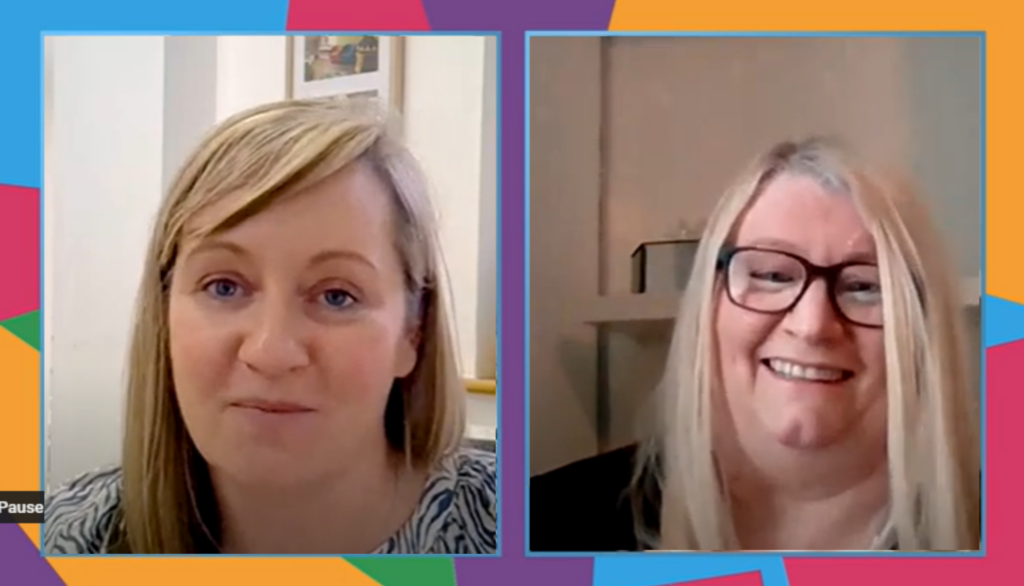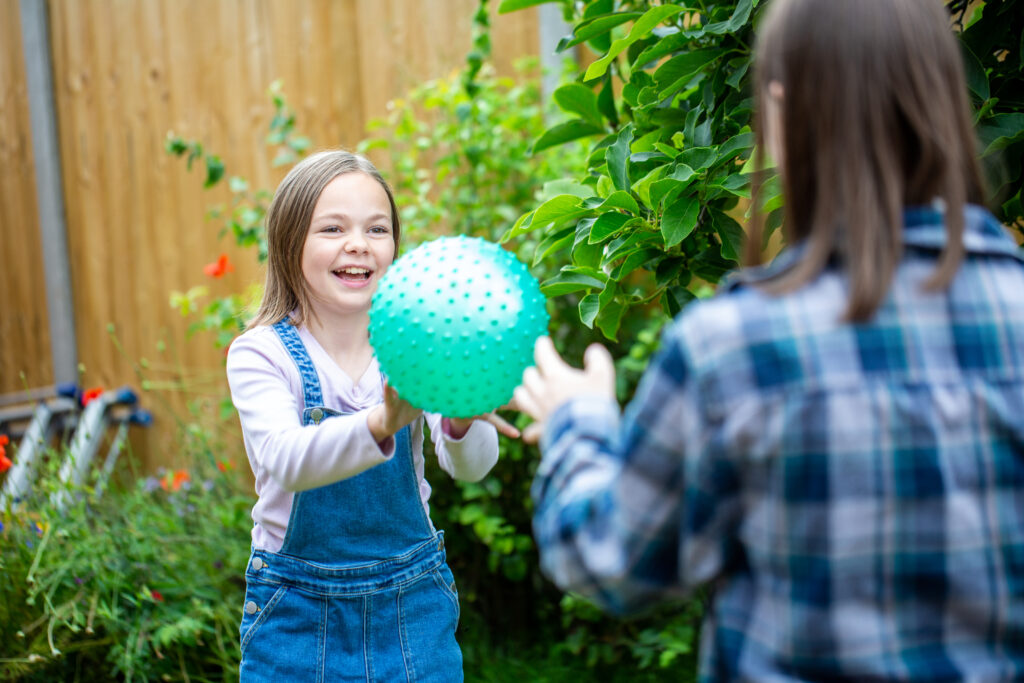
Our foster carer Tracy was awarded as the trauma informed foster carer of the month by The Behaviour Clinic!
The Behaviour Clinic do fantastic work to ‘use trauma informed care to help children heal and thrive’. Their work stems from behavioural science but includes a diverse range of disciplines. This enables their therapists and practitioners to provide thorough and comprehensive support. The behaviour clinic run trainings and workshops to help foster carers, parents, other adults and children.
In this blog we hear from our Foster Wales RCT foster carer Tracy, who was awarded the trauma informed carer of the month. She was interviewed by The Behaviour Clinic and covers the following points:
- Why is understanding the background trauma of children so important?
- What did you find helpful about the trauma informed workshops?
- What have you been able to implement at home from the training?
- What tips would you give other people about being trauma informed?

Why do you feel understanding background trauma of children is so important?
The main thing I find is that to be able to understand what the child has been through, we need to gain as much information as possible about them, which is not always easy.
To get the children to move forward, especially little ones, they need to have some understanding of what’s happened to them. Where possible, it may be helpful for them to know the reasons why they might be struggling with building friendships, or why they might have issues at school and need to catch up with learning. Basically, making sure that as they’re moving forward, they get the support they need – especially emotional support. We find things like remembering their family by keeping them in every day conversations can help.
I’ve got two older children and they’re good at giving them the emotional support they might need, which helps reduce stress. For example, the children might have feelings of guilt, they may feel like it’s all their fault, when we all know it isn’t. We all help to make them feel safe and without blame.
A lot of people think children that have suffered trauma can never get over it
but they can and they do, they live a normal life. Trauma is, of course, very bad, but they can be helped when it’s handled correctly and with the right training. The trauma-informed care training is fantastic, and it’s taught me to keep track of they things the children have done along the way, noting things down, little things you become aware of, for if/when they move on. That will be a big help to the child when they’re ready to look back at their journey.
If there are behavioural issues, you always think about what’s happened before, and what in that moment has been done differently to normal. For example, one child decided they didn’t want toast for breakfast, and that was something that upset them for the rest of the day. So it’s just being aware of situations and what has previously happened, to reduce the stress it may cause if it happened again.
Digesting things yourself is important, and not being afraid to talk to the child about what happened is too. Trust is huge – learning and gaining the trust of the child. You get a feeling when you know that child trusts you, and it’s an absolutely lovely feeling.
To recap on why understanding the background of a child is important:
- Understanding what the child has been through
- To help children move forward and to help them understand what has happened
- Ensuring they get the support they need as they move forward
- Give them emotional support and reducing their stress
- Gaining the child’s trust
Interviewer: I just wanted to highlight some of the fantastic points you made.
- Considering the child’s family and bringing that into everyday life with your family is so important. All the children we care for do have families, they’ve got people that should be integrated through conversations. Remembering them, and their history into the care and support we’re providing.
- You gave a fantastic definition of trauma-informed care. It’s thinking about things from the child’s point of view – what did the past mean for them and how is that impacting on the present. That’s exactly what trauma-informed care is about! What’s gone on in the past, how is that impacting them now, and how do we integrate that into our care and practice.
You’re very experienced, having been a foster carer for 15 years, and yet you still attend the MAPPS workshops for trauma informed training.
Can you explain what you found helpful about the trauma informed workshops, and why you continue to attend even though you’ve plenty of experience as a foster carer?
I like the online training, because having three children at home, it’s sometimes hard to go out to attend. The content of the training is great, the material is always relevant! I often pick sessions that are relevant to me, but sometimes I do the ones that are not as relevant because I think the more information you can gather the better as you never know what child you will care for next. So if you know a little about everything, when you then have a child that has a different type of trauma to those you’ve supported before, you have some sort of knowledge about how to handle situations.
The variety of training is great. It’s up to date, the information is valid, and they always share other information you can find online that may be helpful.
The time is in school time, which is great!
I’ve done behaviour therapy with Jake, a 12 week course, which I found absolutely fantastic. Having that 12 week course prepares you to think about what might happen, what if this happens, and helps you keep everything together. Learning about routines, learning about your house rules, involving the child. Involving the child (where age appropriate) about decisions for them. Simple things like house rules when a child comes into your house you think ‘okay we have a list of 12 rules’ and Jake asking if we really need 12, could we compress it down? We don’t want the child to be worrying about ‘don’t do this, don’t do that, I can’t do this or that’. Involving the child in this is a great idea.
The information on the training is simple, it’s nothing too technical. I enjoy the chat rooms as it’s always nice to listen to other people. You always pick something up and go away having learned something. I’ve been doing this for 15 years, but there’s always something you can take out of a training session. I enjoy the training.
To recap on what has been useful in the training and why Tracy attends:
- Online training helps, especially while caring for children at home
- The training is up to date
- It prepares you for what might happen
- The information taught is simplified and easy to understand
Interviewer: Brilliant, thank you. We have tried to make it so they are in school time and easier for people to attend.
So you’ve said about using routines, boundaries and making sure you have rules set out and as simplified as possible for young people when they come into your care.

Is there anything else from the trauma informed training that’s been helpful, that you’ve been able to implement at home as a foster carer?
When you take in someone else’s child and there is a massive trauma, it’s hard to start a conversation with that child. You need to know what to say, when to say it, listen to them playing, listen to what they’re doing, look at their drawings, look at their little faces.
When you’re on the training you get the idea of when to have the conversation and how far to take the conversation. Also, when to stop and let the child actually talk back, or let them bring something to the conversation. If a child doesn’t want to talk, having the training to recognise these things.
A child will normally say something when you’re driving – so being prepared! I’ve learned not to make promises to the children, I always say ‘Well I don’t know, but we’ll find out’ or ‘we don’t make promises but we’ll see what we can do’. You’ve got to be open, obviously when age appropriate, but be as truthful as you can.
To recap on how to implement trauma informed training:
- How you listen and what you say are important
Interviewer: What you’ve said there about having those difficult conversations, that’s something a lot of people struggle with – how to even start those difficult conversations. We do have some more workshops coming up on that this year actually, so anyone needing that should check those out as well here.
Last question, if you had one tip that you could give to other foster carers about how they can be trauma informed, what would it be?
Gather as much information as you can from the social worker and anybody who is involved. I always go to the school, we have a fantastic primary school nearby and I get reports if anything has happened there, and equally if something has happened at home that I think they should know about for them to watch out for in school.
Cover as much training as possible. Like I said, I do training that isn’t directly relevant at that time because you don’t know what child you’ll care for next. No two children are the same.
Don’t be afraid to ask questions, even when you’re on the training. There are no silly questions! Somebody will always have an answer and if they don’t, they get back to you.
Always be an advocate for the child. You are that child’s person. If you think something isn’t working, or you think something is wrong, say it, contact your social worker, or whoever you’re working with.
To recap on tips for other foster carers:
- Gather as much information as you can from social workers and anyone involved.
- Cover as much training as possible
- Don’t be afraid to ask questions
- Always be an advocate for your child
Interviewer: All of those points are phenomenal advice. What you said about there are no silly questions is true…if you are thinking of a question in a training session then you can guarantee someone else is thinking the same thing! Pop your hand up, or stick it in the chat if it’s online, it will help everybody.
Thank you Tracey for being our trauma-informed carer of the month, for doing this interview and sharing your experiences. If you would like to watch the full video, visit YouTube.
Thank you to all our foster carers
A huge thank you to all our foster carers! It’s clear that trauma informed care can enhance children’s lives, by understanding what they’re going through and helping them work through it.
No matter what level of training our foster carers are at, we know that each and every one does their best every day. It makes a massive difference and we appreciate them.
If you’d like to find out about fostering in RCT, contact us here.
If you reside outside of RCT and are interesting in finding out more about fostering, visit fosterwales.com
